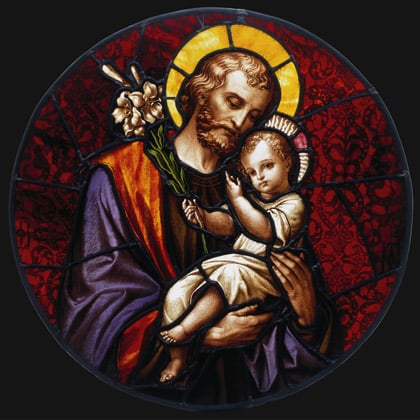
Occasionally, I borrow a Catholic church. Nothing beats it for retreating to sacred space for five or ten minutes on a busy weekday. I can bound up the steps and enter a sanctuary of incense, vaulted ceilings, and stained-glass saints beaming down at me. No one asks me why I’m there – I’m left alone to pray for two minutes or twenty. Other seekers wander in and out, kneeling in quiet petition or contemplation. I am grateful to the Catholics for the generosity of space.
This week, I chose to visit the nun’s chapel – we have a Dominican order just down the street – because I had borrowed another idea from the Catholics and I wanted to spend some time doing something about it. While looking, somewhat absently, for ways to recharge my prayer life, I came across this statement from St. Teresa of Avila, “Those persons who give themselves to prayer should in a special manner always have great devotion to St. Joseph, for I know not how anyone can think of the Queen of Angels during the time that she suffered so much with the Infant Jesus without giving thanks to St. Joseph for the assistance he rendered to them then. He who cannot find anyone to teach him how to pray, let him take this glorious Saint for his guide, and he will not lose his way.”
Kneeling in the incense and mildew of the Dominican sisters’ home, I asked – part expectantly, part skeptically – for a slice of Joseph’s insight and understanding. Why not take an occasional new adventure in faith, right? And I had one small thought that fits me all too well: Quit bringing your worries to prayer. Bring your gratitude and your questions.
I puzzled with that for a few minutes – especially since I’m a big believer in “casting burdens” before God. But here’s the thing: I’m a worrier whose worries can magnify in the echo-chamber of the mind. And when I begin to list my worries before God, I often forget I’m praying and instead regress into an almost whiny cataloging of wishes and fears and pouts. It’s not uncommon for me to feel worse after such a “beseeching prayer” than better, to feel more confused, to feel put-out that I didn’t have a spiritual moment right-then-and-there.
Gratitude and questions? Alright. I began reflecting on the good in my life and then came around to one question. A pretty big one. But I spent sometime mulling about how to ask it in a way absent of worried tones or petulance. And when I found the phrasing, the question itself — asked calmly, reasonably, rationally — gave me more insight than the (as yet unreceived) answer.
I doubt there’s any formula for a perfect prayer life. Have you ever had to reinvent yours? Have you had insights to help recharge yours after those (inevitable?) periods of drought or doldrums?




7 Responses
Deborah, thanks for this story. I love that you find comfort and insight in the sacred spaces of other faith traditions. I too am often deeply touched by the worship places and practices and of other religions.
As for prayer… when I was reading your account, I was struck by how different my (somewhat occassional) prayers are from yours. All I do in my prayers is express gratitude. (In a panicky moment I might ask God for help, but that’s rare.) Really for me, prayer is all about gratitude.
I don’t necessarily think that this is entirely a good thing for me. I’ve stopped asking direct questions and expressing cares in prayer because I have no confidence that I will ever receive any response. That’s sad, isn’t it.
So anyway, don’t be too hard on yourself for previously ‘casting your burdens.’ in prayer. 🙂 I read that as showing great faith, and I admire it.
Thanks, Caroline. I think I first came to appreciate other “sacred spaces” when I traveled to Japan as a 12-year-old and spent a lot of time in Shinto Shrines and Buddhist temples. Very eye-opening to a girl from Utah valley — the smells, the silence, the fish, the monks.
My m.o. is “cast burdens” — I don’t think it’s bad, but they haven’t felt . . . spiritually productive? . . . in many months. I wonder if we don’t need to occasionally reinvent our prayer relationship so that it grows with us. I’ve been stuck in “speak” I used as a high school student.
Hi Deborah,
I’ve also used Catholic churches on my lunch hour – deliberately seeking a quiet reflective space has led me to a couple of nearby Catholic places. Also, believe it or not, I sometimes use a very nearby Holocaust Memorial Center (Farmington Hills MI) – I find the space there incredibly quiet and in the final waiting space most grounded and peaceful. When I sit there my cares wash away and only the most important things (very few of those) can break through. I leave both the Catholic churches and this Jewish space renewed, wanting to be better, and yet at the same time refreshed.
I have often wished our own chapels opened their doors for weekday quiet reflection.
I also tend to lay my woes at the Lord’s feet, hoping He’ll just sweep them away to unseen places. But when I do focus on gratitude, I find the answers to my woes in unexpected ways. I think the Lord is standing somewhere, like my High School biology teacher, just waiting patiently for me to raise my hand. And when I do finally raise my hand, he runs — absolutely runs — over to me to see how he can help me with my science experiment. He may be hoping that by running he can prevent me from blowing up the whole classroom, but all I see is him running to my aid, unconcerned by what small thing I might need to ask him.
I’ve found the Lord isn’t hesitating or halting in coming to me, and when I come to Him in gratitude, he comes to solve my problems anyway, even if those problems go largely unexpressed.
Thanks, Cheryl and Justine.
Cheryl — I actually find our buildings a little creepy if I am there alone for any reason — perhaps because the front doors don’t lead directly to the chapel — you first have to walk down a long (sometimes dark) hallway. I sometimes wish we did have an equivalent — oh those stained-glass windows in Catholic and Episcopal churches . . . I suppose our buildings are consecrated by the communal crowds that gather each Sunday. I love the sound of hallway chatter just after the block ends.
Justine: “hoping He’ll just sweep them away to unseen places.” Guilty. I so frequently, petulantly want quick relief instead of the long path of guidance — even when things aren’t that bad! Hence my new attempt at “gratitude” prayers!
This is a lovely post. I think it’s unfortunate that people are so exclusionary of the belief systems of other religions that they cannot allow for the possibility that there might be beauty and peace to be found in a different venue from what they’re used to. Heaven forbid someone should attend a service of another faith that’s not “the only true church”, let alone allow themselves to “feel the Spirit” there.
Since Mormon churches aren’t traditionally used in this way, ie., walk-in worship, what else are we left with? I know we’re supposed to worship in our homes and all that, but a home with 3 kids under 6 isn’t really peaceful.
About prayer, I think it’s time to reinvent my own. In the past year or so, I’ve made a conscious and somewhat difficult move to using only the formerly formal but now familiar “you” instead of formerly familiar “thee.” I’ve always been irritated that people keep propagating the idea that it’s more respectful to use “thee,” and I decided that if I wanted to converse with God like he was my father, I’d use the way I normally speak.
This helps me feel less silly about praying. I know it’s not for everyone, some people really like the “separate language of prayer,” but I don’t.
I’ve also tried to wean myself from the standard Mormon formulas of “Please bless me that…” and “nourish and strengthen,” and all the other things you hear in SM and at the dinner table.
I went to the Midwest Pilgrims retreat at Kirtland this year, and one of the presentations was on praying the psalms, in order, a few every day. It was wonderful.
Woundedhart: I love the psalms — for their joy and sorrow.
Save me, O God:
for the waters are come in unto my soul.
I sink in deep mire,
where there is no standing:
I am come into deep waters,
where the floods overflow me.
I am weary of my crying:
my throat is dried;
mine eyes fail while
I wait for my God.
Hear me, O Lord. (69: 1-3, 16)
Would love to hear more about what you mean by “praying the psalms.”